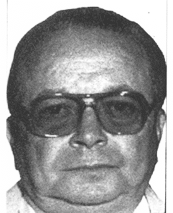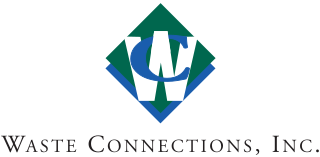EnergySolutions, headquartered in Salt Lake City, Utah, is one of the largest processors of low level waste (LLW) in America, making it also one of the world's largest nuclear waste processors. It was formed in 2007 when Envirocare acquired three other nuclear waste disposal companies: Scientech D&D, BNG America, and Duratek.

Waste Management, Inc., doing business as WM, is a waste management, comprehensive waste, and environmental services company operating in North America. Founded in 1968, the company is headquartered in the Bank of America Tower in Houston, Texas.

Construction waste or debris is any kind of debris from the construction process. Different government agencies have clear definitions. For example, the United States Environmental Protection Agency EPA defines construction and demolition materials as “debris generated during the construction, renovation and demolition of buildings, roads, and bridges.” Additionally, the EPA has categorized Construction and Demolition (C&D) waste into three categories: non-dangerous, hazardous, and semi-hazardous.
There is no national law in the United States that mandates recycling. State and local governments often introduce their own recycling requirements. In 2014, the recycling/composting rate for municipal solid waste in the U.S. was 34.6%. A number of U.S. states, including California, Connecticut, Delaware, Hawaii, Iowa, Maine, Massachusetts, Michigan, New York, Oregon, and Vermont have passed laws that establish deposits or refund values on beverage containers while other jurisdictions rely on recycling goals or landfill bans of recyclable materials.
Dean L. Buntrock is an American businessman and philanthropist most well known for his founding and longtime leadership of Waste Management, Inc., North America's largest waste services company. Over his 40-year career he increased revenue from $1 million to $9 billion.

The Energy Corridor is a business district in Houston, Texas, located on the west side of the metropolitan area between Beltway 8 and the Grand Parkway. The district straddles a 7-mile (11 km) stretch of Interstate 10 from Kirkwood Road westward to Barker Cypress Road and extends south along Eldridge Parkway to Briar Forest Drive. Parts of the district overlap with the Memorial area of Houston. The district is located north of Westchase, another major business district of Houston, and east of Greater Katy.

Allied Waste Industries, Inc. was a Fortune 500 company headquartered in Phoenix, Arizona. A vertically integrated company that owned and operated solid waste collection businesses, recycling facilities, and landfills, it was a leader in the solid waste industry in the United States. It served more than 10 million residential, commercial and industrial customers across 128 major markets in 37 states and Puerto Rico.
Casella Waste Systems, Inc. is a waste management company based in Rutland, Vermont, United States. Founded in 1975 with a single truck, Casella is a regional, vertically integrated solid waste services company. Casella provides resource management expertise and services to residential, commercial, municipal and industrial customers, primarily in the areas of solid waste collection and disposal, transfer, recycling and organics services. The company provides integrated solid waste services in seven states: Vermont, New Hampshire, New York, Massachusetts, Connecticut, Maine and Pennsylvania, with its headquarters located in Rutland, Vermont. Casella manages solid waste operations on a geographic basis through two regional operating segments, the Eastern and Western regions, each of which provides a full range of solid waste services, and larger-scale recycling and commodity brokerage operations. Organics services, major account and industrial services, are also provided.

James "Jimmy Brown" Failla was an American mobster who was a high ranking caporegime with the Gambino crime family and a major power in the garbage-hauling industry in New York City. Failla's crew was based in Brooklyn, with operations stretching into Staten Island, Manhattan, and New Jersey.

Waste Connections of Canada Inc., formerly Progressive Waste Solutions, is a waste collection company, that provides non-hazardous solid waste collection, recycling, composting, renewable energy, and landfill disposal services to commercial, industrial, municipal, and residential customers throughout the United States and Canada. The company is based in Toronto, and its headquarters in the United States is in The Woodlands, Texas.

Republic Services, Inc. is a North American waste disposal company whose services include non-hazardous solid waste collection, waste transfer, waste disposal, recycling, and energy services. It is the second largest provider of waste disposal in the United States after Waste Management.
Browning-Ferris Industries v. Kelco Disposal, 492 U.S. 257 (1989), was a case in which the Supreme Court of the United States held that the Eighth Amendment's prohibition of unreasonable fines does not apply to punitive-damage awards in civil cases when the United States is not a party.

Stericycle is a compliance company that specializes in collecting and disposing regulated medical waste, such as medical waste and sharps, pharmaceuticals, hazardous waste, and providing services for recalled and expired goods. It also provides related education and training services, and patient communication services. The company was founded in 1989 and is headquartered in Bannockburn, Illinois, with many more bases of operation around the world, including Medical waste incinerators in Utah and North Carolina.
Service Corporation of America was a Boston-based waste and environmental services company in North America. The company was later a subsidiary of Waste Management, Inc., active from 1970-1984.

Waste Connections, Inc. is a North American integrated waste services company that provides waste collection, transfer, disposal and recycling services, primarily of solid waste. It has operations in both the United States and Canada. Its headquarters is located in The Woodlands, Texas. It is the third largest waste management company in North America.

Clean Harbors, Inc. is an American provider of environmental and industrial services, including hazardous waste disposal for companies, small waste generators and federal, state, provincial and local governments.
The former Operating Industries Inc. Landfill is a Superfund site located in Monterey Park, California at 900 N Potrero Grande Drive. From 1948 to 1984, the landfill accepted 30 million tons of solid municipal waste and 300 million US gallons (1,100,000 m3) of liquid chemicals. Accumulating over time, the chemical waste polluted the air, leached into groundwater, and posed a fire hazard, spurring severely critical public health complaints. Recognizing OII Landfill's heavy pollution, EPA placed the financial responsibility of the dump's clean-up on the main waste-contributing companies, winning hundreds of millions of dollars in settlements for the protection of human health and the environment.
The City of Oakland, California, adopted a Zero Waste Strategic Plan in 2006, detailing a road map for the city to follow toward the implementation of a Zero Waste System by 2020. As stated in a City Resolution, introduced by then Mayor Jerry Brown, Zero Waste principles:
The Newby Island Landfill (NISL) is one of the largest active landfills on the shores of the San Francisco Bay. It is located in Santa Clara County, California in the United States. The site is located within the city limits of San Jose, California at the western terminus of Dixon Landing Road. The address is 1601 Dixon Landing Road, Milpitas. Although the address and public street access to the site are both in the City of Milpitas, the landfill property is entirely within the City of San Jose. Newby Island Landfill has a length of 5.07 km (3.15 mi). It is located West of the City of Milpitas near Dixon Landing Road and Interstate 880. It is the terminus for waste for all of San Jose (62%), Santa Clara (14%), Milpitas (10%), Cupertino (5%), Los Altos (2%) and other cities (7%). The 342-acre pile is currently permitted to operate until 2041 and may extend up to 245 feet. The landfill is an island surrounded by a levee which keeps its runoff from directly entering the bay, and the water that drains from it is treated in the landfill's own treatment plant. Electricity for the landfill is generated by burning the methane collected from the decomposition of the waste. Dried sewage sludge from the nearby San José–Santa Clara Regional Wastewater Facility is the material used as cover, mixed in with the trash, blending San Jose's waste streams. It is operated by Republic Services (Republic), which, along with Waste Management Incorporated, transports and disposes of most of the household trash in the United States.

GFL Environmental Inc. is a waste management company with headquarters in Toronto, Canada. GFL operates in all provinces in Canada, and currently employs more than 8,850 people. The company provides environmental services to municipal, residential, commercial, industrial and institutional customers. On July 6, 2021, the company announced the formation of the Resource Recovery Alliance (RRA) and an agreement to acquire Canadian Stewardship Services Alliance.











